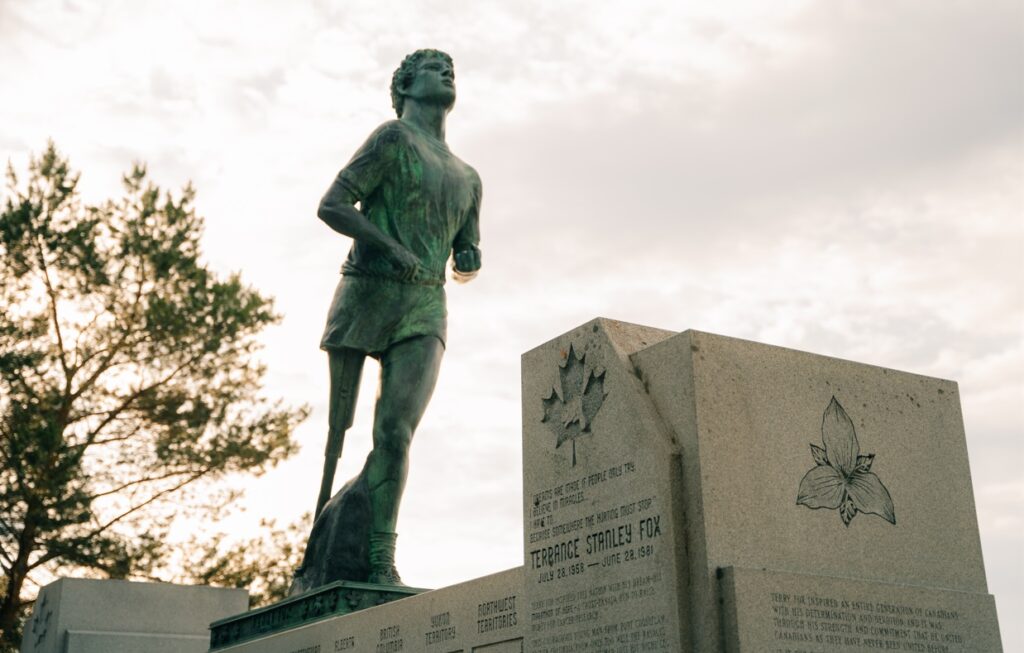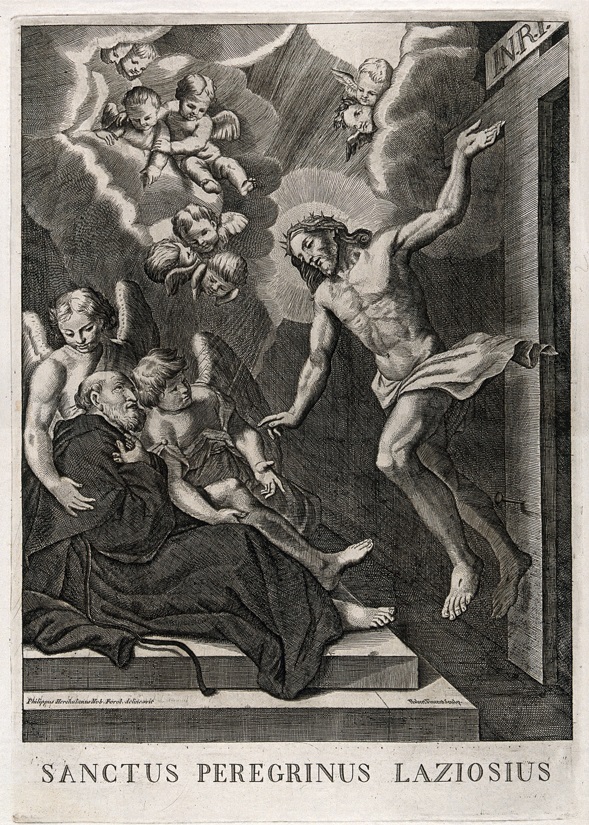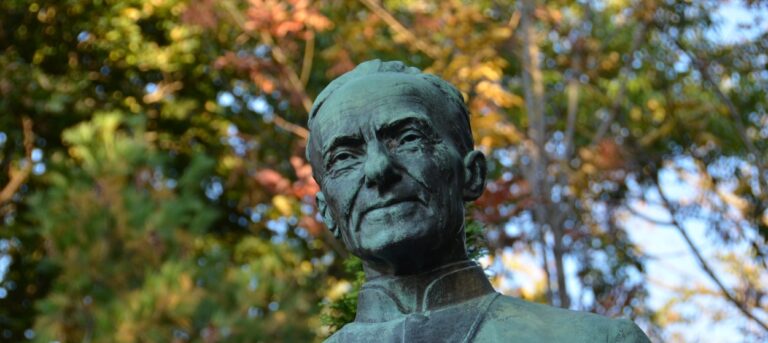
TERRY FOX, ST. PEREGRINE AND FINDING HOPE

September 14 is a day to celebrate the 45th anniversary of Terry Fox’s Marathon of Hope. Growing up millennial and Canadian, I was part of the first generation to participate in fundraiser run and walk each September. I can recall sitting with my classmates in a darkened gymnasium in Mississauga, Ontario, watching original footage of Terry in a documentary shown year after year before the school run began. I felt mystified by this 22-year-old who seemed trapped in 1980. Terry was my parents’ age and yet felt so unlike them, preserved on film in simple grey shorts and a worn tee as an athletic young adult, so uncertain of his own future.
Terry embodied values Canadians hold dear: humility, patience, perseverance, and courage. Earlier this year, The Tragically Hip—whose beloved frontman Gord Downie died from brain cancer in 2017—released a limited-edition numbered vinyl of their 1992 hit “Courage” adding (for Terry) to raise funds for cancer research. Talk about Canadian.
When the song was jointly released in a short film by the Terry Fox Foundation, Finish It, watching it cast me back to 2003, in an uncharacteristically quiet assembly with my peers, choking back tears.
Courage, my word
It didn’t come, it doesn’t matter
Courage, it couldn’t come at a worse time
Thinking of his agonizing press conference in Thunder Bay, where he announced that the cancer had now spread to his lungs and that his run must end, that last line rings and rings in my ear.
Having recently finished a Ph.D. studying medieval Christianity, when I think of Terry Fox, a veritable patron saint in Canadian folklore for his advocacy of cancer research, I think of St. Peregrine. Born in the papal states at the end of the thirteenth century, he joined the Order of the Servants of Mary (AKA the Servites) and dedicated his time to caring for the ailing and the poor. At the age of 60, cancer had spread in his right leg—the same leg as Terry.
Like Terry, medical experts recommended amputation of the cancerous leg to save his life. According to those in his community, he spent the anxious night before the procedure in the chapter house of his priory, where typically the monks would meet and read the Martyrology together. He spent the night deep in prayer, contemplating the room’s painting of the crucifixion on the wall. In his sleep, he felt Christ touch the ill limb.
Unlike Terry, however, the cancer miraculously disappeared by the morning of the operation. His amputation was cancelled, and he lived for another 25 years—longer than Terry’s time on this earth. When he died in 1345, people gathered from far and wide to honour how he treated those in need of a helping hand in sickness and poverty. He was canonized in 1726.
As Rick Hansen once commented, Terry’s marathon encouraged others to focus on one’s ability rather than disability. Peregrine was intent on living his life in penance for Our Lady, apparently choosing frequently to stand rather than sit to the extent of leaning over a choir stall in times of desperation. Both were hard on their bodies to show others how determination and effort can reshape the conditions of our world. Both modeled how the limits of our embodiment can be resisted, proving that the flesh can be the means to demonstrate our mental fortitude and resolution to do better with our time on earth.

Peregrine is the patron saint of persons suffering from cancer, and terminal or otherwise life-threatening illness.
As we continue to perform local pilgrimages to echo his courageous trek, I think Canadians would agree that Terry, too, at least in our country, leads as a virtuous icon. “Our next generation of students will be the ones to continue Terry’s fight and lead this worthy cause towards his dream of a world without cancer,” commented the Terry Fox Foundation.
A world without cancer? Imagine.
Courage, my word
********
For more on how one’s struggle with illness can lead to a deepening of faith, I recommend Peter Le’sMy Life of Grace (2023). Or Letters to My Lord (2016), deeply personal letters addressed to Christ as a priest succumbed to his cancer.
If you’re looking for something on the experience of grief as a path back to God, bestselling author Kathy Hendricks offers a beautiful testament in Grace in the Wound (2023). Or a classic from the beloved Joyce Rupp, May You Find Comfort: A Blessing for Times of Grieving (2010).
For young readers on grief, try Milo and the Cycle of Life or See You on the Other Side. On disability, ability, and working towards togetherness, This is How We Play.
To donate to the Canadian Cancer Society à Dedicate your donation | Canadian Cancer Society
St. Peregrine Prayer:
O great St. Peregrine, you have been called “The Mighty” and “The Wonder-Worker,” because of the numerous miracles which you have obtained from God for those who have had recourse to you.
For so many years you bore in your own flesh this cancerous disease that destroys the very fiber of our being, and who had recourse to the source of all grace when the power of man could do no more.
You were favored with the vision of Jesus coming down from His Cross to heal your affliction. Ask of God and Our Lady, the cure of the sick whom we entrust to you.
(Pause here and silently recall the names of the sick for whom you are praying)
Aided in this way by your powerful intercession, we shall sing to God, now and for all eternity, a song of gratitude for His great goodness and mercy. Amen.
Dr. Margaret Slaughter is the acquisitions editor of English titles at Novalis Publishing. She has three degrees in religious studies, specializing in the study of Roman Catholicism.


